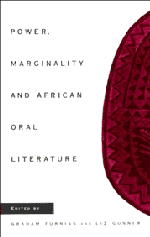Book contents
- Frontmatter
- Contents
- List of contributors
- Preface
- Note on transcription
- 1 Introduction: power, marginality and oral literature
- Part I Orality and the power of the state
- Part II Representing power relations
- Part III Oral forms and the dynamics of power
- Part IV Endorsing or subverting the paradigms: women and oral forms
- 11 Sexuality and socialisation in Shona praises and lyrics
- 12 Nontsizi Mgqwetho: stranger in town
- 13 Clashes of interest: gender, status and power in Zulu praise poetry
- 14 Jelimusow: the superwomen of Malian music
- Part V Mediators and communicative strategies
- Bibliography
- Index
13 - Clashes of interest: gender, status and power in Zulu praise poetry
Published online by Cambridge University Press: 18 December 2009
- Frontmatter
- Contents
- List of contributors
- Preface
- Note on transcription
- 1 Introduction: power, marginality and oral literature
- Part I Orality and the power of the state
- Part II Representing power relations
- Part III Oral forms and the dynamics of power
- Part IV Endorsing or subverting the paradigms: women and oral forms
- 11 Sexuality and socialisation in Shona praises and lyrics
- 12 Nontsizi Mgqwetho: stranger in town
- 13 Clashes of interest: gender, status and power in Zulu praise poetry
- 14 Jelimusow: the superwomen of Malian music
- Part V Mediators and communicative strategies
- Bibliography
- Index
Summary
Often in the discussion of forms of culture certain art forms and certain manifestations of culture are privileged while others tend to be pushed out and marginalised. This process is invariably related to power: the forms that are the expression of those who are in a position of dominance are foregrounded. They, in turn, tend to be selected and discussed by those both inside and outside the culture. In the process there is often a further distortion and the art forms that express the dominant discourse of power envelop, muffle or disguise the other expressive forms. These in some cases become so marginalised in the focus of interest and debate that they become almost silent, almost invisible. The dominant forms become at one level the only forms. The others may continue to flourish within the culture itself but in the scholarly or academic discourse that has seen only the dominant forms they are reduced to whispers and footnotes.
This model which relates to selection and distortion, and forms that flourish unrecognised and undebated outside what becomes seen as ‘official culture’, can be used for an analysis of the relation between high culture and popular culture, or what Bakhtin (1984) calls ‘unofficial culture’ (see also Barber 1986).
- Type
- Chapter
- Information
- Power, Marginality and African Oral Literature , pp. 185 - 196Publisher: Cambridge University PressPrint publication year: 1995
- 5
- Cited by



